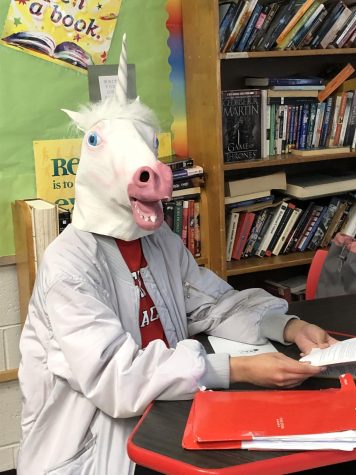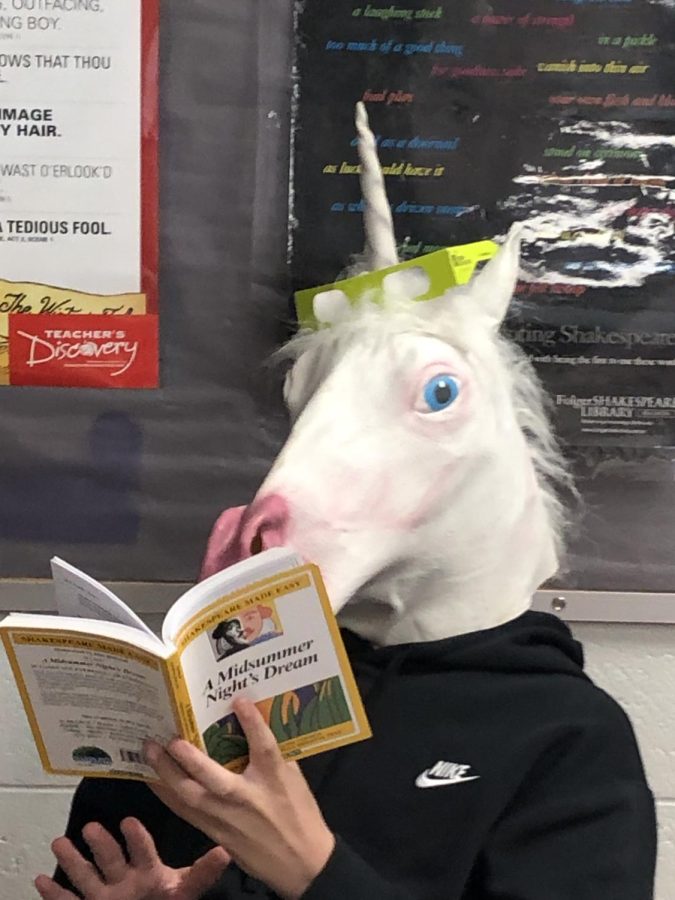Hurling Insults and Wearing Masks: A Middle School Student’s Dream?
A pensive Ryan Dauble considers his next line.
April 28, 2023
Soft! Methinks I hear the merry sounds of students speaking in iambic pentameter! What are they saying? Wait, are they swearing at each other in some archaic language? Hold on! Is that kid wearing a unicorn mask?
Curious? Let’s get to the BOTTOM of this!

My eighth grade Language Arts students are currently reading/performing William Shakespeare’s A Midsummer Night’s Dream.
The centuries-old comedy, set in Athens, Greece, follows four plot lines, and involves two realms of royalty, a twisty love triangle (trapezoid?), fairies, and a band of wanna-be actors.
In preparation for the play, my students have viewed a Google slides presentation about life during the Renaissance Era, and I’ve brought in one of my costumes which is made up of a skirt, chemise, bodice, and snood.
The students were also introduced to a variety of words and phrases of Elizabethan English, and enjoyed a few spicy rounds of insulting each other using a menu-style chart provided (years ago) by EHS’s multi-talented Mr. William Ullman.
“THOU ART A MONSTROUS PALE-HEARTED HOBGOBLIN!” cheerfully bellowed a member of my period 1/2 class.
“OH YEAH? WELL, THOU ART A YEASTY SHAG-EARED HEDGEHOG!” another happily retorted.
Yup. That’s what you may have heard behind the door of room 125 last week. This week may be some odd singing and, um, braying – like a donkey. Unicorn?
I have an interesting assortment of costumes and things at home. I don’t have a donkey mask, but I do have a unicorn one.
Why all the fuss?
I’m a big fan of having fun and showing kids that the classics don’t have to be these dead, dry, and dull things. Props and costumes always help, but I think it’s really important to focus on the fact that this was a human who wrote for other humans about being human.
Who doesn’t get the idea of unrequited love? People have been relegated to the friend zone for ages!
Thinking of revenge? People do, but they often find it to be hollow, unsatisfying, and self-destructive. Ask Macbeth, Hamlet, Romeo…
So are the students enjoying themselves, or getting anything out of the experience?
Demetra Koutsothanasis shared, “I like how the story is in Athens, Greece because I am from Greece. I don’t like how confusing it is to keep up with all of the stories. I think we’re reading Shakespeare’s words because it might teach us some lessons and help us prepare for 9th grade.”
You could be right. *Cough, cough* Romeo and Juliet. *Cough, cough*
Jack Roig stated, “I like the old English that was used, but I don’t like how long it takes between my parts. I think we’re reading this to get a glimpse of how English evolves and what it evolved from.”
Nate Caiola added, “Honestly, the play is pretty fun in general. It’s fun to read out loud and listen to everybody play their parts.”
As they further their exploration of the play, the students will be analyzing themes, and discussing the role of “the changeling”. They’ll also see who deserves the blame for the confusion that ensues. Is it Lysander? Demetrius? Robin Goodfellow? Nick Bottom?
I want to tell you it’s Shakespeare’s for writing it, but maybe it’s me for sharing it with them.
If this teacher has offended,
Think but this, and all is mended…
and now this article has ended.
“Though she be but little, she is fierce” (Shakespeare 3.2 331)
(No wonder I have an affinity for this play.)






